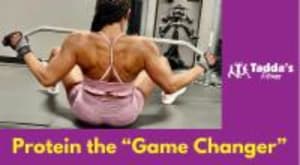
May 19, 2023
Protein the “Game Changer”
Are you getting enough protein in your diet? While you may watch your calories, sugar, and salt intake, you should also make sure you are ingesting enough protein. It plays a key role in the creation and maintenance of every cell in our bodies. It fuels our cells and powers our bodies. It is important to consume protein every day. Daily protein intake plays a role in keeping your cells in good shape and should be part of your daily health maintenance plan.
Protein is made up of amino acids, commonly known as building blocks, because they are attached in long chains. It is also considered a “macronutrient,” meaning that you need relatively large amounts of it to stay healthy.
Protein is responsible for helping to promote muscle repair and growth, so people who are doing any type of exercise that regularly breaks down their muscles (such as strength training, running, or any other form of vigorous exercise) need to ensure that they consume enough protein to support their body’s needs. Even though you might not think of yourself as an athlete, if you exercise regularly, then your body believes otherwise.
Why your body needs protein. Here are five compelling reasons why you should make sure you are getting enough protein every day:
1. Build. Protein is an important building block of bones, muscles, cartilage, and skin. In fact, your hair and nails are comprised mostly of protein.
2. Repair. Your body uses it to build and repair tissue.
3. Oxygenate. Red blood cells contain a protein compound that carries oxygen throughout the body. This helps supply your entire body with the nutrients it needs.
4. Digest. About half the dietary protein that you consume each day goes into making enzymes, which aids in digesting food, and making new cells and body chemicals.
5. Regulate. Protein plays an important role in hormone regulation, especially during the transformation and development of cells during puberty.
How protein can help you stay in shape
Eating high-protein foods has many fitness benefits, including:
- Speeding recovery after exercise and/or injury
- Reducing muscle loss
- Building lean muscle
- Helping maintain a healthy weight
- Curbing hunger
- Another benefit of protein — it fills you up faster. Protein plus fiber keeps us full longer, which means you don’t feel the urge to eat as often. This helps keep weight down while fueling our cells with the right nutrients they need.
How Tadda’s Fitness help you get more protein.
Cafe’-Protein shakes. We offer whey and vegan. You can always add an extra scoop of protein.
Taking protein powder after a workout has long been considered the gold standard. Fast-absorbing proteins deliver amino acids into your bloodstream precisely when they're needed the most. Consuming protein powder after a workout will help your tired muscles recover faster and bounce back even stronger.
When you’re pressed for time and unable to prepare a meal, a protein shake can come in handy. Make sure to preorder your shake before class.
You can easily add protein powders like whey and pea protein to shakes, smoothies, energy balls, yogurt, pancakes and more to increase the protein and fullness factor.
Wellness Center-Vitamin B12 super shot has protein in it that helps to tone your muscles.
IV Therapy -Recovery & Performance or Glutathione drip.
An athletic IV drip is a fast and effective way to deliver the fluids, vitamins, and minerals your body needs for improved athletic performance and fast recovery. The nutrients in an IV solution completely bypass the digestive system and are immediately and fully absorbed into the bloodstream.
Through IV therapy, your athletic performance stays at peak levels. Once your body receives the right dose of hydration, your muscles also recover faster than ever.
Strength Training Classes- Bootcamp, Powerlift & WorkTime class.
A vigorous workout is taxing on the muscles, and the body needs fuel from your diet in order to allow your muscles to rebuild and grow. Protein, one of the three macronutrients (along with fat and carbohydrates), is the building block of the muscles, and without enough protein, you may not see the results you’re trying to achieve through your workouts.
Education-Having one of our trainers review your daily meal plan journal is key to bringing awareness and accountability. You really don’t know what you’re doing until you see your habits written down daily.
I often tell my clients to watch “Game Changer” on Netflix. Knowledge is power. Do yourself a favor and watch this informative documentary.
How much protein is recommended for people who work out?
There is a great deal of confusion that surrounds the amount of protein people actually need in order to function properly. This is due in large part to concern over whether or not people eating plant-based diets can naturally obtain enough protein (they can) and a general belief that people need large amounts of protein in order to function.
In fact, the Recommended Daily Allowance (RDA) for protein is 0.36 grams per pound of body weight. For a 150 pound person, that equates to 54 grams of protein per day. However, the Recommended Daily Allowance is the amount of protein that a person needs to ingest in order to avoid a protein deficiency. In other words, it’s the bare minimum.
The Recommended Daily Allowance is not sufficient enough to support muscle recovery and growth, so it won’t work for people who are trying to build muscle and fuel their workouts. That means that people who work out regularly, especially those who strength train on a consistent basis, need to boost their protein intake.
Individuals who strength train regularly require double Recommended Daily Allowance of protein, or 0.72 grams per pound of body weight. For a 150 pound person, this equates to 109 grams of protein each day. The best way to optimize your protein intake for maximum results is to spread your protein intake out throughout the day over three to four meals.
Should you drink a protein shake before or after a workout?
One common belief is that the best time to drink a protein shake is within 30 minutes of exercise, which is commonly referred to as the “anabolic window.” The concept of the anabolic window promotes the idea that there is a brief period of time in which the body and muscles can effectively synthesize protein, helping you to grow muscle and recover more efficiently.
Now that you got the scoop on the importance of protein let’s become game changers and build muscle together. No Mess



